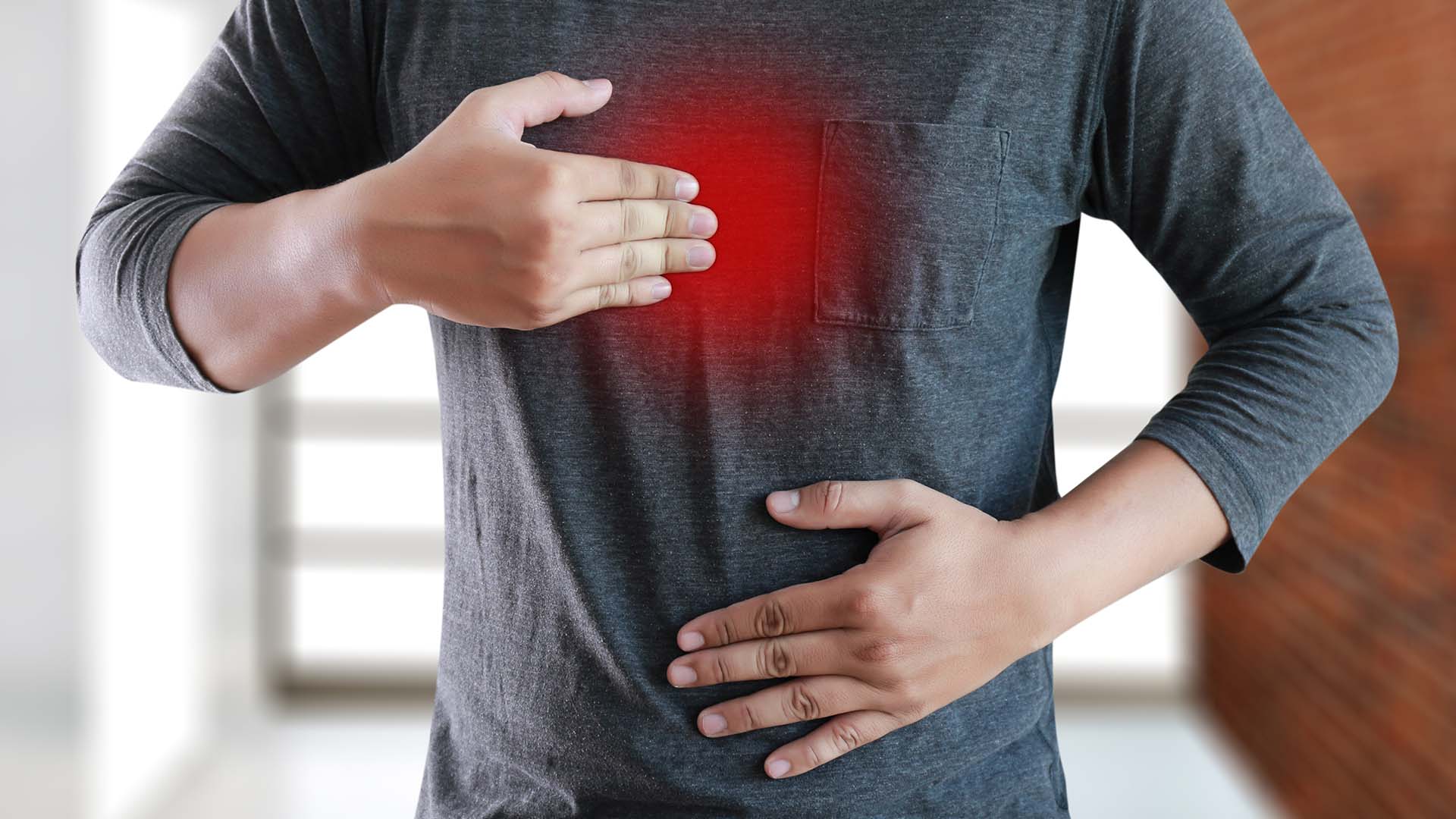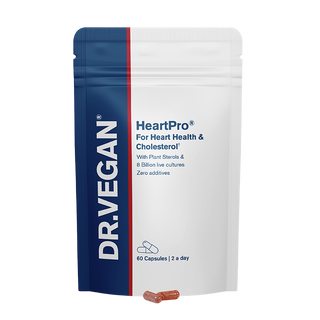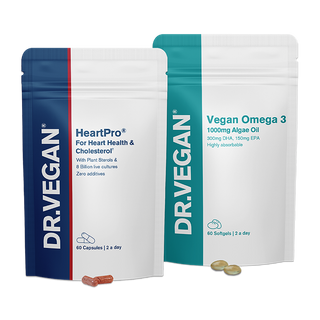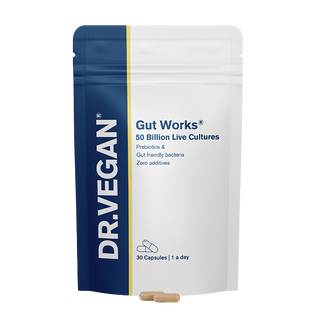The impact of your gut on your heart

Gut health relates to the functioning of the entire gastrointestinal tract, which is the 9 meter long tube that delivers the food we eat, from our mouth to our bottom. Our gut health impacts the digestion and absorption of our food and so many other vital functions. There are numerous reasons why looking after our gut health matters, from supporting mental and emotional wellbeing, keeping our hormones in check, to glowing and healthy skin. But how does our gut health affect our heart? Isabelle Nunn, an expert nutritional therapist who practiced as a pharmacist for 10 years, explains.
How does the gut play a role in heart health?
Our gut is home to a community of trillions of bacteria, viruses and fungi, which make up the gut microbiome. Evidence suggests that the gut microbiome and its genes play a role in influencing our body weight and our heart health.
When gut bacteria break down particular foods, they produce compounds called 'metabolites'. An imbalance in gut bacteria means more metabolites are produced, which can raise cholesterol levels or harm our blood vessels. Links have been found between alterations in the gut microbiota, its metabolites and cardiovascular diseases (CVDs), as well as future cardiovascular events, including high blood pressure. You may also enjoy reading 'How to manage blood pressure naturally'.
The inflammatory marker 'TMAO' (Trimethylamine N-oxide) is an example of this. It gets produced when there is a presence of certain unhealthy bacteria. Links show that elevated levels of circulating TMAO can result in a 62% higher risk of cardiovascular diseases such as heart attacks and strokes.
Not sure what your body needs? Create your Diet Profile.
How do imbalances in the gut impact heart health?
Irritation itself can worsen cardiac function and put us at risk of cardiovascular diseases (CVDs). Although inflammation itself is simply a normal, protective response of the body's tissues against stimuli, like irritants or harmful bacteria, when inflammation is left unaddressed it can become chronic.
Poor gut health can be caused by a ‘leaky gut’ which in turn can lead to food intolerances, bloating or fatigue, amongst other conditions. A ‘leaky gut’ occurs when the lining of the gut allows partially digested food or toxins into the bloodstream. Toxins, including the bacterial toxins such as Liposaccharides (LPS), have been found to contribute to inflammation in the gut and other areas of the body, once they leave the gut and reach the bloodstream.
Ultimately a combination of an imbalance of gut microbiota and increased permeability (i.e. a leaky gut) can cause chronic inflammation and, in turn, cause CVDs. Therefore, it is essential that we support these two areas.
How your diet can support the gut-heart axis
One of the best and easiest ways to support the gut-heart axis is to consume plenty of the below nutrients. In-fact, the Mediterranean diet is often cited as one of the healthiest in the world. This is because it is packed with flavours, variety, plenty of healthy fats and polyphenol-rich foods.
Evidence shows that consuming 30 plants every week can be extremely beneficial for good gut health - don’t forget that grains, nuts, seeds, spices, and herbs also count as plant-based foods. The wider variety and diversity of fibre-packed plants you eat, the happier and more diverse your gut microbiome will be. You may also enjoy reading 'a nutritionist's food guide for a healthy heart'.

Nutrients that support good gut health, microbial composition and a healthy heart
B vitamins
B vitamins are vital for a healthy heart, and they can be found easily in a healthy diet. They can also be found in our high strength B Vitamin complex, UltraEnergy.
Vitamin B1 contributes to the normal function of the heart and supports the digestion of protein, carbohydrates and cholesterol. B12 is vital for the formation of red blood cells, while Vitamins B6, B12, and Folic acid help break down homocysteine - an amino acid that can damage the inner walls of the arteries. Vitamin B6 can help provide protection for the gut against high levels of inflammation, while Folate may help support the replication of new cells in the gut wall. Discover our nutritionists guide to best foods for a healthy heart.
B vitamins can deplete more easily when we're anxious or stressed, or on a non-meat diet. Learn about the potential signs of a Vitamin B12 deficiency.
Probiotics (live bacteria)
Fermented foods can provide a source of probiotics (live bacteria), and examples include kimchi, kombucha, sauerkraut, live cultures in yoghurts and miso. Foods ferment as a result of the addition of microbes such as bacteria and or yeast. Learn more in 'What are probiotics?'.
Maintaining the right balance of healthy bacteria and restoring your gut health can be helped with the consumption of ‘active bacteria’ in the form of probiotics. You may also enjoy reading the latest gut health research and the most common causes and symptoms of IBS.
It is important to note that not all probiotics are created equal. Be mindful and check the labels of your supplements to avoid nasty additives, such as anti-caking agents or bulking agents like microcrystalline cellulose, silicon dioxide or magnesium stearate commonly used in formulations. Also beware of plant sweeteners and artificial sweeteners which increase the risk of type 2 diabetes and cardiovascular disease and are found in most protein shake and meal replacement powders. You may also enjoy the '7 ingredients in supplements to avoid'.
HeartPro®

Antioxidants and Polyphenols
Polyphenols are naturally occurring compounds found in plant foods, which can also act as antioxidants. Antioxidants help to protect the cells in the heart and other organs from oxidative stress which may otherwise contribute towards cardiovascular diseases (CVD), amongst others.
Great sources of antioxidants include garlic, ginger root and Red Rice Yeast extract. While red wine, dark chocolate, berries, spices such as Curcumin (turmeric), tea and herbs are all great sources of polyphenols.
Polyphenols can help lower blood pressure and LDL levels (bad cholesterol) and improve HDL levels (good cholesterol). You may enjoy reading '5 Tips to improve 'healthy' cholesterol' and hear our nutritionists explain what is cholesterol and learn about 5 cholesterol myths.
Recommended supplements
HeartPro® includes 8 billion clinically studied, active, friendly bacteria, carefully selected for their effect on heart health. Lactobacillus plantarum has clinically shown to reduce discomfort associated with blood pressure and cholesterol, all while supporting gut health.
Discover HeartPro® for Heart Health and Cholesterol.
HeartPro® also includes Black Garlic, Ginger Root, Plant sterols, and Red Rice Yeast Extract - along with vital B vitamins and Coenzyme Q-10, to support good heart health and cholesterol levels.
For complete daily heart support, you may want to consider pairing HeartPro® with our Vegan Omega 3. Omega 3 is an essential fatty acid that supports the healthy function of your heart circulation and blood pressure. It is considered an essential fatty acid as the body cannot produce it and therefore needs to be consumed through our diet or through supplementation.
Heart Health Bundle

You may also enjoy reading:
- Latest gut health research: IBS causes & symptoms revealed
- How stress and anxiety affects the heart
- Warning signs of a heart attack
- Why you should improve your gut health
- Why your gut is your second brain
- How your gut and vagina are linked
- 6 signs of an unhealthy gut
Discover our range of award-winning vegan supplements and probiotics.
Want to hear more from our nutritionists? Sign up to our email newsletter for insights and exclusive offers:
References:
- Altered intestinal function in patients with chronic heart failure - PubMed (nih.gov)
- Aoun, A. Darwish, F and Hamod, N. (2020) The Influence of the Gut Microbiome on Obesity in Adults and the Role of Probiotics, Prebiotics, and Synbiotics for Weight Loss. Prev Nutr Food Sci;25(2):113-123. The Influence of the Gut Microbiome on Obesity in Adults and the Role of Probiotics, Prebiotics, and Synbiotics for Weight Loss - PMC (nih.gov)
- Cheng, Yu-Chen. Et al (2017). Polyphenols and Oxidative Stress in Atherosclerosis-Related Ischemic Heart Disease and Stroke - PMC (nih.gov). Oxid Med Cell Longev: 8526438.
- Hofeld, B.C., Puppala, V.K., Tyagi, S. et al. (2021) Lactobacillus plantarum 299v probiotic supplementation in men with stable coronary artery disease suppresses systemic inflammation. Sci Rep;11, 3972. Lactobacillus plantarum 299v probiotic supplementation in men with stable coronary artery disease suppresses systemic inflammation | Scientific Reports (nature.com)
- JHeianza, Y. et al. (2017) Gut Microbiota Metabolites and Risk of Major Adverse Cardiovascular Disease Events and Death: A Systematic Review and Meta‐Analysis of Prospective Studies | Journal of the American Heart Association (ahajournals.org)
- Liu YW, Liong MT, Tsai YC. (2018)New perspectives of Lactobacillus plantarum as a probiotic: The gut-heart-brain axis. J Microbiol;56(9):601-613. New perspectives of Lactobacillus plantarum as a probiotic: The gut-heart-brain axis - PubMed (nih.gov)
- MacDonald, Daniel et al. (2018) American Gut: an Open Platform for Citizen Science Microbiome Research | mSystems (asm.org)
- Poti, F et al. (2019) Polyphenol Health Effects on Cardiovascular and Neurodegenerative Disorders: A Review and Meta-Analysis - PMC (nih.gov) Int J Mol Sci;20 (2): 351.
- Sandek A. et al, 2007. Altered intestinal function in patients with chronic heart failure. J Am Coll Cardiol;50(16):1561-9.



















